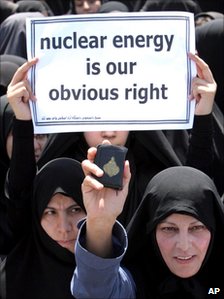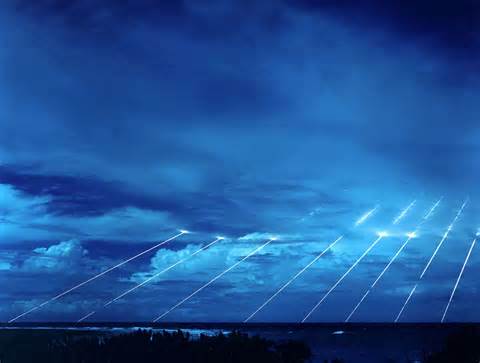According to a poll conducted in July 2012 by “The Times of Israel” (any biases aside), 80% of Americans view Iran’s nuclear program as a threat to the US and its NATO allies, and only 6% don’t. These sentiments are still highly prevalent today, a year later. It is high time, therefore, to take a proper look at the looming threat a “nuclear Iran” poses.
The development of nuclear weapons has always been a pressing issue in contemporary concerns of international security. Because the nuclear bombs of the 21st century are more powerful than those used on Nagasaki and Hiroshima, fears among NATO citizens and politicians are high; the implications of nuclear weapons for the current generation remain unclear.
NATO members tend to accept certain states possessing nuclear weapons, while rejecting others. It is assumed by NATO members that the “Big 5” (China, Russia, the UK, the US, and France) are deterred from using their weapons by the inherent threat of mutually assured destruction (the idea that a full-scale use of nuclear weapons by two opposing sides would result in the destruction of both the attacker and the defender). This threat makes them ‘responsible’ owners of these weapons. For states that are not part of the Big 5, other considerations are on their side. NATO members tend to reason that Israel is unlikely to use its weapons because it is already the strongest military power in the region and is backed by the USA so would not need to use its weapons. India, it is assumed, fears destruction from Pakistan.
However, NATO members object to certain ‘rogue’ states developing nuclear capabilities, citing their concerns for ‘misuse’. The general, and understandable, concerns lie with North Korea, Pakistan, and Iran. It is possible that NATO members see them as home to closed, oppressive, and uncooperative leaders, making them unpredictable and likely to use their nuclear capabilities as a pawn in the larger chess game for power. Iran is considered by NATO members to be in a particularly unique position. Surrounded by hostile (Sunni) neighbours, there is a strong assumption by NATO members that Iran does not fall subject to the deterrent of mutually assured destruction because she feels she already faces destruction from her neighbours. The views held by both sides have led to growing tensions that are hard to diffuse.
But is there another way of looking at the status quo? When the 9/11 attacks occurred it was Iran, under President Khatami, who played a key role in trying to help capture members of terrorist organisations. If Iran could be of service to the US and her NATO allies when they most needed it, perhaps her nuclear program is not all that demonic. The latest buzzword from NATO regarding its role in the world is that it is responsible for “peace creating.” If that is the case, toning down the criticism on Iran’s nuclear ambitions could arguably be a more constructive approach, for two reasons. Firstly, as the objections of NATO and the West to Iran’s developing nuclear capabilities increase, so too does Iran’s desire to have them, and use them in a way that hinders the West (be it as blackmail or full blown force). Conversely, if NATO respects Iran’s desire to develop, Iran will have less incentive to act antagonistically. Secondly, though this may sound like appeasement, and despite fears that Iran’s nuclear ambitions reach beyond civilian use, there are several realities that ensure Iran would not be able to actually use nuclear weapons, even if they were developed.
To delve into Iran’s nuclear ambitions, her motives must be assessed. Nuclear weapons have an acquired status in telling one’s people that their country and their government are technologically advanced. A case-in-point is Pakistan. In 1998, Prime Minster Nawaz Sharif gained huge admiration from his people after he detonated a nuclear bomb. Nuclear weapons are also important in geopolitical rhetoric; symbolic of a country’s power and international standing. For politicians in Tehran to admit that their motive is domestic privilege would be to admit that Iran is not advanced and lose face in front of her people. Indeed, her obsession with nuclear development may be a way to distract the people from the country’s weakening economy, (which, ironically, is a result of sanctions enacted because of her nuclear program). The fact remains no matter who is in power in Iran, be it the newly elected President Hassan Rouhani’s (whose campaign promises included engagement with the West over Iran’s nuclear program), or the Green Movement (a movement which began as protests against the 2009 election and called for secular government institutions), Iran would still want nuclear capabilities for the reasons discussed above.
More tangibly, and in relation to why Iran would never actually use a nuclear bomb, are the practicalities. Which country could Iran realistically attack? Iran is considered a threat by NATO members because it lashes out against Israel. But what NATO members perhaps fail to consider is that were Iran to launch a nuclear bomb against Israel, it would wipe out a devastating number of Palestinians, the very people she claims to be fighting for. Furthermore, such a launch would undoubtedly result in a sustained, full blown nuclear ‘defence’ attack by Israel and the US, which would incinerate the entire country.
[captionpix align=”left” theme=”elegant” width=”320″ imgsrc=”http://natoassociation.ca/wp-content/uploads/2013/07/iran-nuclear-program.jpg” captiontext=”Ahmadinejad: a key concern over the past eight years.”]
The Red Button
Moreover, the internal power structures in Iran means the President does not have a “red button” that would suddenly launch a nuclear attack. Two factions have control in Iran: Supreme Leader Ali Khamenei and the Revolutionary Guard. From a historical standpoint, the Supreme Leader is the successor to Ayatollah Khomeini, whose importance rests on the role he played in building and redefining modern Iran. But even if his fatwa denouncing nuclear weapon stockpiling (the accumulation of weapons held in reserve for use at a time of emergency) is empty rhetoric, the interests of the Revolutionary Guard, whose power goes above and beyond the figure of the President, present a more important reason for why Iran would not launch a nuclear attack. They have deep commercial interests, such as control of most of the oil, natural gas and resources, which are guaranteed by their not entering a nuclear war.
So what now?
Canada has, historically, taken a less condescending attitude to other countries when it comes to Iran; other NATO members would do well to learn from this. A failure to re-asses the current position whereby only UN Security Council Members are trusted to possess nuclear weapons could create unnecessary enemies. The reality is that Iran has nuclear ambitions. The more NATO and the West do to stop her achieving them, the more extreme these ambitions will become. NATO runs the risk of isolating Iran to a point where Iran’s true capabilities will become unknown. Instead, NATO and the West can afford to respect (at least on the surface) Iran’s desire to be “technologically advanced,” while secure in the knowledge that America’s military spending is twice the amount of Iran’s GDP – guaranteeing she is no threat, on top of the fact that there is overwhelming evidence which suggests it would be suicide for Iran to ever use a nuclear weapon.




